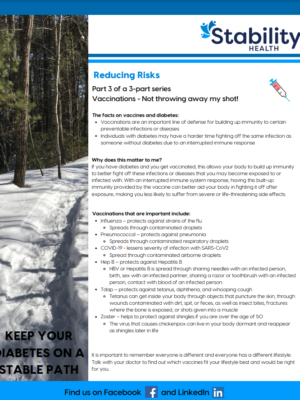
Part 3 of a 3-part series
Vaccinations – Not throwing away my shot!
The facts on vaccines and diabetes:
- Vaccinations are an important line of defense for building up immunity to certain preventable infections or diseases
- Individuals with diabetes may have a harder time fighting off the same infection as someone without diabetes due to an interrupted immune response
Why does this matter to me?
If you have diabetes and you get vaccinated, this allows your body to build up immunity to better fight off these infections or diseases that you may become exposed to or infected with. With an interrupted immune system response, having this built-up immunity provided by the vaccine can better aid your body in fighting it off after exposure, making you less likely to suffer from severe or life-threatening side effects.
Vaccinations that are important include:
- Influenza – protects against strains of the flu
- Spreads through contaminated droplets
- Pneumococcal – protects against pneumonia
- Spreads through contaminated respiratory droplets
- COVID-19 – lessens severity of infection with SARS-CoV2
- Spread through contaminated airborne droplets
- Hep B – protects against Hepatitis B
- HBV or Hepatitis B is spread through sharing needles with an infected person, birth, sex with an infected partner, sharing a razor or toothbrush with an infected person, contact with blood of an infected person
- Tdap – protects against tetanus, diphtheria, and whooping cough
- Tetanus can get inside your body through objects that puncture the skin, through wounds contaminated with dirt, spit, or feces, as well as insect bites, fractures where the bone is exposed, or shots given into a muscle
- Zoster – helps to protect against shingles if you are over the age of 50
- The virus that causes chickenpox can live in your body dormant and reappear as shingles later in life
It is important to remember everyone is different and everyone has a different lifestyle. Talk with your doctor to find out which vaccines fit your lifestyle best and would be right for you.
Tips for Caregivers
Diabetes impacts more than just the individual diagnosed. It also impacts their support system.
How can I be supportive of my loved one with diabetes?
Ask. Ask your loved one with diabetes what you can do. Find out if there is anything you can do for them. This simple action can go a long way in showing your support while letting your loved one tell you what would be the most helpful for them.
Offer. Whether it is offering to accompany them to appointments, so another set of ears can digest the information being given. Or offering to help them navigate the pros and cons of a new device or meal plan.
Listen. Listening to them express their confusion and concerns with navigating this new lifestyle can be extremely helpful. Even simply being there for support.
Talk. Keep talking! Communication is so important. Having an outlet to talk about feelings, concerns, and accomplishments can be very helpful. There are many support groups offered as well; not only for the newly diagnosed but for caregivers and loved ones as well. Defeat Diabetes Foundation has a directory to find a support group in your state. Click here to be directed to their page.
After a new diagnosis, it can feel like your entire life and all the conversations you have are now about diabetes. It doesn’t have to be this way! Keep enjoying things you enjoyed pre-diagnosis. It may mean learning how to navigate these activities with diabetes, but the important part is that you keep doing the things you love. Vacations, special occasions, hobbies, sports, field trips. All these things can still fit into your new lifestyle. Although they may take a little more planning and preparation than pre-diagnosis, they can still be a great outlet and create some wonderful memories!
Coach’s Corner
Winter weather workout safety info
Keeping up with your exercise goals can be challenging especially when the conditions outside are not ideal. Here are some helpful tips to keep yourself safe during the winter months.
Dress in layers
- Start with lightweight (not cotton) layer next to your skin which provides warmth and wicks away sweat.
- Next layer provides warmth – either wool or fleece work well.
- Top layer should be wind and water resistant.
Hydration
- Dry air can dry you out – make sure that you drink plenty of water before, during and after your winter workout!
Beware of frostbite and hypothermia
- Exposed skin plus your fingers and toes are at risk for frostbite during extreme cold temps.
- Protect yourself by covering up and limiting your time outside when the air temperature goes below freezing.
- Wearing a hat and gloves (or mittens) are important any time you go outside in cold weather.
- Keeping your torso warm will help prevent hypothermia.
Monitor weather conditions
- During extreme weather conditions, consider moving your workout indoors.
- Know where you can find shelter and how to get medical help immediately before you go.
